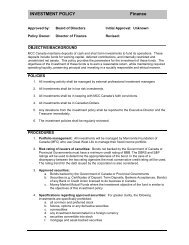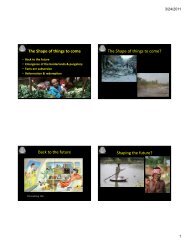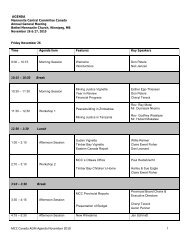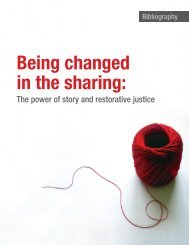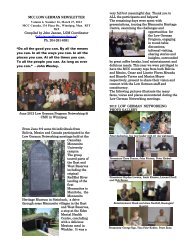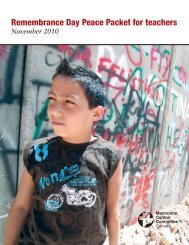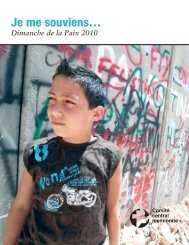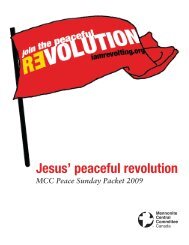Walking together: Healing and hope for Colombian refugees
Walking together: Healing and hope for Colombian refugees
Walking together: Healing and hope for Colombian refugees
You also want an ePaper? Increase the reach of your titles
YUMPU automatically turns print PDFs into web optimized ePapers that Google loves.
w a l k i n g<br />
t o g e t h e r<br />
95<br />
HELPING THE FAMILY FEEL AT HOME<br />
There are many little ways to help your new friends feel at home <strong>and</strong> welcomed into their new<br />
community. Short, spontaneous phone calls <strong>and</strong> visits, although not the norm in Canadian culture, will<br />
likely be very meaningful to the <strong>Colombian</strong> refugee family. Celebrating occasions that are special to<br />
<strong>Colombian</strong>s, such as New Years <strong>and</strong> birthdays would be another way to help the family feel at home.<br />
Finally, finding ways to learn from the family about their culture will give them opportunities to share<br />
who they are <strong>and</strong> what is dear to them, <strong>and</strong> can be a complementary process to them learning about<br />
Canadian culture. Knowing that the church community values <strong>and</strong> is interested in their culture will<br />
be a special gift to the <strong>Colombian</strong> family, as it will open up opportunities to talk about their history<br />
<strong>and</strong> assure them that the church community loves them <strong>and</strong> is delighted to have them in their<br />
community.<br />
Reviewing the section Underst<strong>and</strong>ing our Differences <strong>and</strong> especially the pages containing Cultural Tips<br />
might be helpful as you think about this topic.<br />
Here are some questions to think about as you plan how you will help<br />
the family feel at home:<br />
1. Perhaps there are people in your congregation that would be willing to offer<br />
accompaniment to the family through frequent, short phone calls? Who could they<br />
be?<br />
2. Are there any members of your congregation that would be willing to commit to<br />
dropping by the home of the refugee <strong>for</strong> visits?<br />
3. What can you do to ensure that the refugee family isn’t alone, but rather in<br />
community, on days that are special to them? While it is almost certain that New<br />
Year’s will be a day they yearn to spend with friends <strong>and</strong> family (they may feel extra<br />
homesick on that day), how can you find out what other days during the year are<br />
special to them (<strong>for</strong> example, a daughter’s 15th birthday)? Being alone on these<br />
special days would be a painful reminder of their losses, however, sharing those<br />
occasions with new Canadian friends in their new home community could help<br />
create a sense of being “at home” in a new place.<br />
4. Are there families in your church that would be willing to ensure that the refugee<br />
family doesn’t spend those certain special days alone? How can you plan <strong>for</strong> them to<br />
be surrounded by community at those times?<br />
5. How will you get to know their culture? Are there people in your church that would<br />
be interested in learning about <strong>Colombian</strong> cooking, music, art, geography or dance?<br />
If so, how can you encourage these people to see out the refugee family <strong>and</strong> show<br />
their genuine interest?



